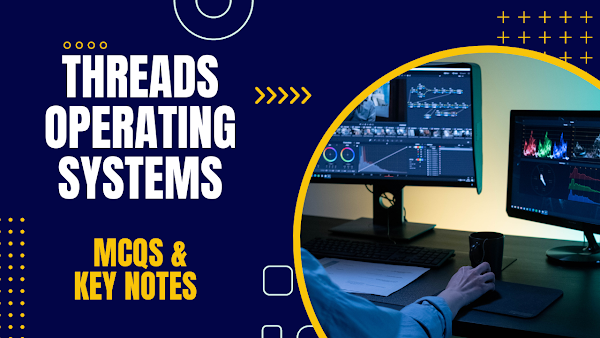Explore OS Threads with MCQs and Key Notes, perfect for quick learning. Enhance your knowledge efficiently with this resource.
Which of the following best describes a thread?
(a) A lightweight process that can be scheduled and run concurrently with other threads.(b) A heavyweight process that requires its own dedicated memory space.
(c) A virtual machine that emulates a separate computer system.
(d) A software interrupt that handles asynchronous events.
Answer
Answer: (a)
Explanation:
Threads are lightweight processes that share the same address space and resources as the process that created them. This makes them more efficient than creating separate processes for each task.
What is the main advantage of using threads?
(a) Improved application performance(b) Better responsiveness
(c) More efficient use of system resources
(d) All of the above
Answer
Answer: (d)
Explanation:
Threads offer several advantages, including improved application performance, better responsiveness, and more efficient use of system resources.
| Learn Operating System at " CompEduBox - Computer Course " For free
What is the key difference between a process and a thread?
(a) Processes run in separate memory spaces, while threads run in a shared memory space.(b) Processes are independent entities, while threads are part of a process and share its resources.
(c) Processes have their own program counter, register set, and stack space, while threads do not.
(d) Both (a) and (b)
Answer
Answer: (d)
Explanation:
Processes are independent entities, while threads are part of a process and share its resources. Threads also have their own program counter, register set, and stack space.
Which of the following is NOT an advantage of using threads?
(a) Improved application performance(b) Better responsiveness
(c) Processes have their own program counter, register set, and stack space, while threads do not.
(d) More efficient use of system resources
Answer
Answer: (c)
Explanation: Threads do have their own program counter, register set, and stack space.
| Learn Operating System at " CompEduBox - Computer Course " For free
What are the two main types of threads?
(a) User-level threads(b) Kernel-level threads
(c) Both (a) and (b)
(d) Neither (a) nor (b)
Answer
Answer: (c)
Explanation: The two main types of threads are user-level threads and kernel-level threads.
Which of the following is an advantage of user-level threads?
(a) Easier to implement than kernel-level threads(b) More efficient context switching
(c) Simpler representation
(d) All of the above
Answer
Answer: (d)
Explanation: User-level threads are generally easier to implement and manage than kernel-level threads.
| Learn Operating System at " CompEduBox - Computer Course " For free
Which of the following is a disadvantage of user-level threads?
(a) Lack of coordination with the kernel(b) Entire process can be blocked if one thread is blocked
(c) Both (a) and (b)
(d) Neither (a) nor (b)
Answer
Answer: (c)
Explanation: User-level threads can suffer from a lack of coordination with the kernel and may be blocked if the entire process is blocked.
Which of the following is an advantage of kernel-level threads?
(a) Up-to-date information on all threads(b) Better handling of applications that block frequently
(c) More time provided to processes that require it
(d) All of the above
Answer
Answer: (d)
Explanation: Kernel-level threads are more tightly integrated with the operating system and can provide better performance and responsiveness.
Which of the following is a disadvantage of kernel-level threads?
(a) Faster than user-level threads(b) More complex to implement than user-level threads
(c) Both (a) and (b)
(d) Neither (a) nor (b)
Answer
Answer: (b)
Explanation: Kernel-level threads are more complex to implement than user-level threads because they require direct interaction with the kernel.
What are the basic components of a thread?
(a) Stack space(b) Register set
(c) Program counter
(d) All of the above
Answer
Answer: (d)
Important Key Notes On Threads in Operating System
Answer
- Threads are lightweight processes that share the same address space and resources as the process that created them.
- Threads can improve application performance by running tasks concurrently.
- Threads are managed by the operating system and can be scheduled independently of each other.
- Threads can share data with each other without the need for interprocess communication.
- Threads have their own program counter, register set, and stack space.
- Multithreading allows multiple threads to share the resources of a single process.
- Multithreading can improve the responsiveness and performance of applications.
- Threads are more efficient than processes for tasks that require frequent context switching.
- Threads can be used to effectively utilize multiprocessor systems.
- Threads can communicate with each other more easily than processes.
- Threads can enhance the throughput of a system by dividing a process into multiple tasks.
- There are two types of threads: user-level threads and kernel-level threads.
- User-level threads are easier to implement but have limited functionality.
- Kernel-level threads are more powerful but have higher overhead.
- Threads are a fundamental concept in operating systems and are essential for efficient and responsive application development.




0 Comments